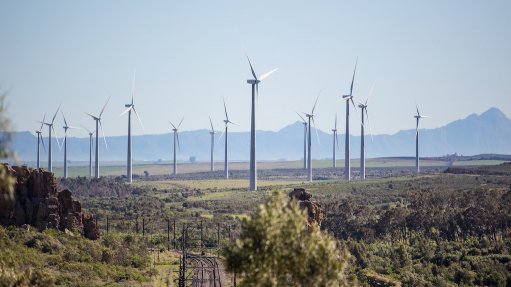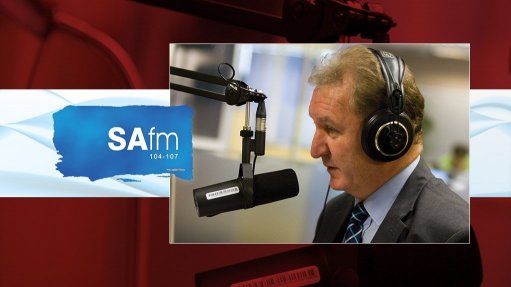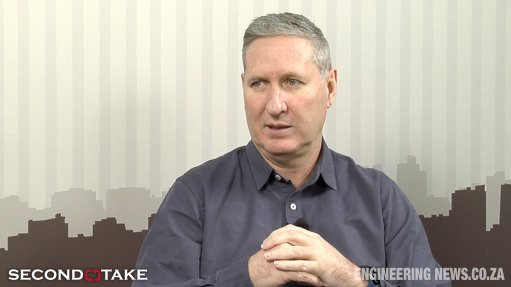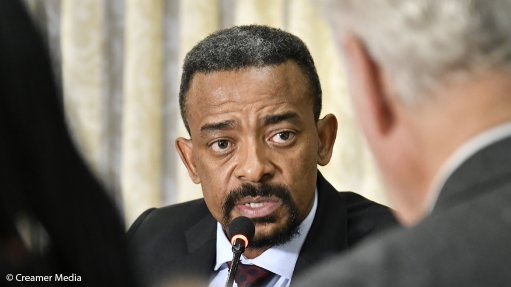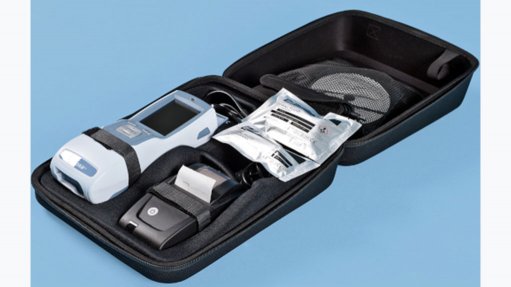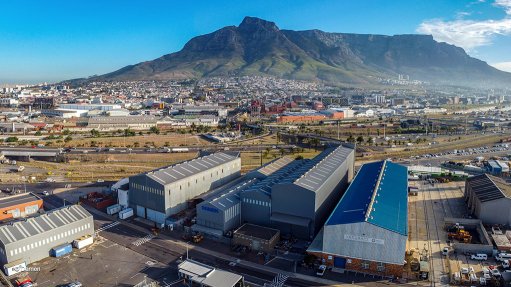Ramaphosa acknowledges fear over NHI but describes signing as ‘pivotal moment’

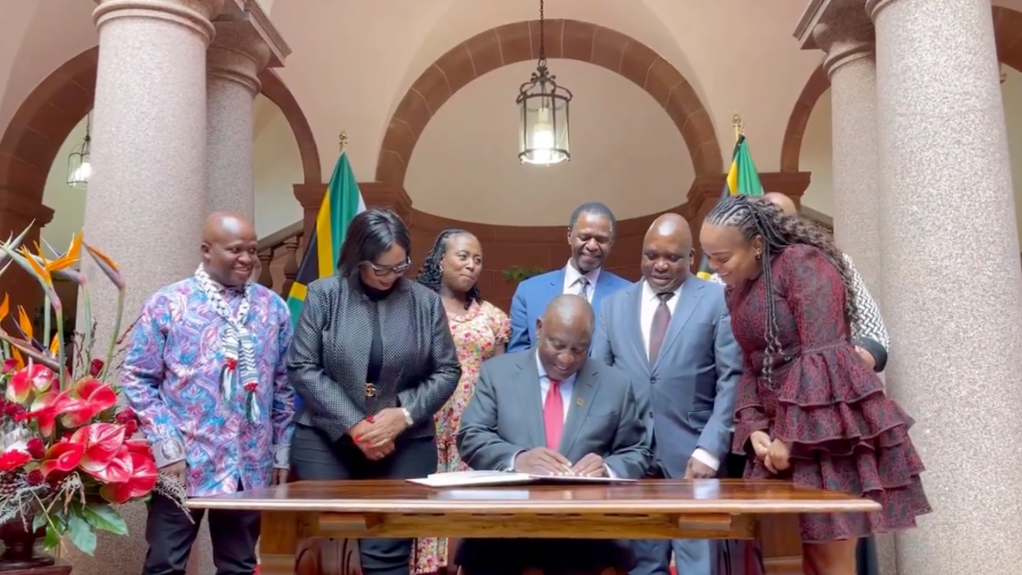
President Cyril Ramaphosa signing the controversial NHI Bill into law at a Union Buildings ceremony
President Cyril Ramaphosa acknowledged the fear that his signing of the National Health Insurance (NHI) Bill into law had generated during a ceremony held at the Union Buildings on Wednesday.
However, he described the NHI as an opportunity to break with the prevailing inequality in the health system and called on stakeholders to work with government to make it work.
“We are a country that has been built on dialogue and partnership, on working together to overcome differences in pursuit of a better life for all its people. Let us work together, in a spirit of cooperation and solidarity, to make the NHI work,” Ramaphosa appealed.
He was speaking, however, against the backdrop of strenuous opposition to the legislation by healthcare practitioners, funders, business, civil society groupings, some trade unions, as well as opposition political parties and an expectation that the Act would be challenged legally.
Nevertheless, Ramaphosa described the signing – which he had signalled his intention to carry out on several occasions, including while on the campaign trail ahead of what is set to be a highly competitive election on May 29 – as a “pivotal moment in the transformation of our country”.
He likened the current anxiety to fears expressed ahead of the transition to democracy and the introduction of the right to strike and argued that those fears had proved to be unfounded.
“By putting in place a system that ensures equal access to health care regardless of a person’s social and economic circumstances, the NHI takes a bold stride towards a society where no individual must bear an untenable financial burden while seeking medical attention.”
Despite grave concerns about the implications of the NHI for taxpayers, as well as the potential for corruption, the President did not provide details on how the scheme would be financed.
He said only that the NHI would be funded through a comprehensive strategy that would combine various financial resources, including additional funding and reallocating funds already in the health system.
It has been estimated that the NHI would require yearly funding of at least R400-billion.
“The financial hurdles facing the NHI can be navigated with careful planning, strategic resource allocation and a steadfast commitment to achieving equity,” the President added.
Speaking from the same podium, Health Minister Dr Joe Phaahla emphasised that the yet-to-be-established NHI Fund, which would procure services from public and private service providers, would be governed by a board made up of “people of good standing”.
Both Phaahla and Ramaphosa also underlined that implementation would be pursued on a phased basis and would not be implemented as a single event.
“Following the signing of this Bill, we will be establishing the systems and putting in place the necessary governance structures to implement the NHI based on the primary health care approach,” Ramaphosa said.
They also denied that the legislation has been rushed and that its passage had failed to follow the correct procedure, arguing that it had undergone thorough consultations ahead of the parliamentary process, which had itself endured for five years.
“What we need to remember is that South Africa is a constitutional democracy.
“The Parliament that adopted this legislation was democratically elected and its members carried an electoral mandate to establish a National Health Insurance.
“South Africa is also a country governed by the rule of law in which no person may be unduly deprived of their rights,” the President said.
Ahead of the signing, the South African Health Professionals Collaboration (SAHPC), which represents more than 25 000 private and public sector healthcare workers, expressed profound disappointment at the President’s decision to sign the Bill into law.
“Where we are now is unprecedented, and we believe that the NHI, in its current form, will reverse rather than progress equitable, quality healthcare in South Africa,” SAHPC spokesperson Dr Simon Strachan said.
“We have no doubt that the NHI Bill will be challenged in the courts, and we are currently exploring all our options in this regard.”
Likewise, Business Unity South Africa (Busa) and Business Leadership South Africa (BLSA) expressed their unhappiness, with Busa CEO Cas Coovadia describing it as “unworkable” and that it would consider “legal interventions, so that the legislation that is finally implemented is in the best interest of our country”.
BLSA CEO Busisiwe Mavuso described the signing as an “electioneering ploy”.
Various other organisations also indicated that they were preparing to oppose the Act legally, including the Democratic Alliance, whose leader, John Steenhuisen, said that the party intended to challenge the NHI “all the way to the Constitutional Court”.
Comments
Press Office
Announcements
What's On
Subscribe to improve your user experience...
Option 1 (equivalent of R125 a month):
Receive a weekly copy of Creamer Media's Engineering News & Mining Weekly magazine
(print copy for those in South Africa and e-magazine for those outside of South Africa)
Receive daily email newsletters
Access to full search results
Access archive of magazine back copies
Access to Projects in Progress
Access to ONE Research Report of your choice in PDF format
Option 2 (equivalent of R375 a month):
All benefits from Option 1
PLUS
Access to Creamer Media's Research Channel Africa for ALL Research Reports, in PDF format, on various industrial and mining sectors
including Electricity; Water; Energy Transition; Hydrogen; Roads, Rail and Ports; Coal; Gold; Platinum; Battery Metals; etc.
Already a subscriber?
Forgotten your password?
Receive weekly copy of Creamer Media's Engineering News & Mining Weekly magazine (print copy for those in South Africa and e-magazine for those outside of South Africa)
➕
Recieve daily email newsletters
➕
Access to full search results
➕
Access archive of magazine back copies
➕
Access to Projects in Progress
➕
Access to ONE Research Report of your choice in PDF format
RESEARCH CHANNEL AFRICA
R4500 (equivalent of R375 a month)
SUBSCRIBEAll benefits from Option 1
➕
Access to Creamer Media's Research Channel Africa for ALL Research Reports on various industrial and mining sectors, in PDF format, including on:
Electricity
➕
Water
➕
Energy Transition
➕
Hydrogen
➕
Roads, Rail and Ports
➕
Coal
➕
Gold
➕
Platinum
➕
Battery Metals
➕
etc.
Receive all benefits from Option 1 or Option 2 delivered to numerous people at your company
➕
Multiple User names and Passwords for simultaneous log-ins
➕
Intranet integration access to all in your organisation







